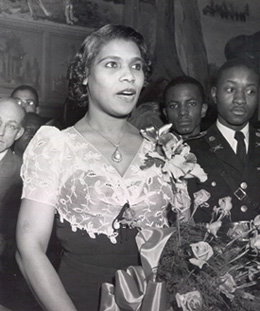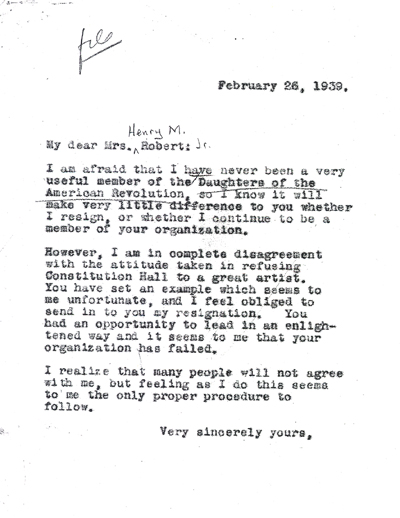
February 26, 1939 -
Eleanor Roosevelt Resigns from the Daughters of the American
Revolution
On February 26, 1939, Eleanor Roosevelt resigned from the Daughters of the American Revolution in support of African American opera singer Marian Anderson.
As a celebrated opera singer Marian Anderson was used to attracting public attention for her singing, but ironically it was her inability to sing that placed her at the center of great controversy and drew the attention of one of the most famous women of her time, First Lady Eleanor Roosevelt.
During the 1930s, African American contralto Marian Anderson sang at Europe's most famous concert halls and met great success, but when she returned to the United States she encountered racism, discrimination, and segregation. In January 1939, Ms. Anderson wanted to give a performance at Constitution Hall in Washington, D.C., but was told by the manager that she could not use the hall because of a prior engagement. After her request for alternate performance dates was also refused, the reason for Ms. Anderson's dismisal was clear. Marian Anderson could not sing at Constitution Hall because the Hall's owners - the Daughters of the American Revolution (D.A.R.) - had a policy to not allow African American performers on the stage.
Many people spoke out against the Daughters of the American Revolution's policy, but the civil rights issue soon took on national importance; the D.A.R. had one member that was not willing to sit idly by as the organization discriminated against Marian Anderson, and that was Eleanor Roosevelt. From the beginning, there was no question whose side Mrs. Roosevelt was on; a champion of civil rights, Eleanor Roosevelt welcomed both blacks and whites at the White House, and even invited Marian Anderson to perform there in 1936. However, as the First Lady, Eleanor Roosevelt was aware her actions could anger some of her husband's southern political supporters, but in the end Mrs. Roosevelt put politics aside and followed her conscience. On February 26, 1939, Eleanor Roosevelt sent a letter to the Chairwoman of the Daughters of the American Revolution announcing her resignation. Mrs. Roosevelt's resignation and commentary on social justice published in her weekly "My Day" column THE NEXT DAY BROUGHT NATIONAL ATTENTION to the issue of civil rights.
Marian
Anderson did not sing at Constitution Hall in 1939. Instead, thanks to the
support of the Roosevelt administration, Ms. Anderson gave a concert on
April 9, 1939, Easter Day, at the base of the Lincoln Memorial and the
concert was broadcast across the country. That day Marian Anderson's voice
was not confined by the segregationist policy of the Daughters of the
American Revolution but instead reached into THE HOMES OF AMERICANS
THROUGHOUT THE NATION.
Eleanor Roosevelt's letter of resignation and "My Day" column:
